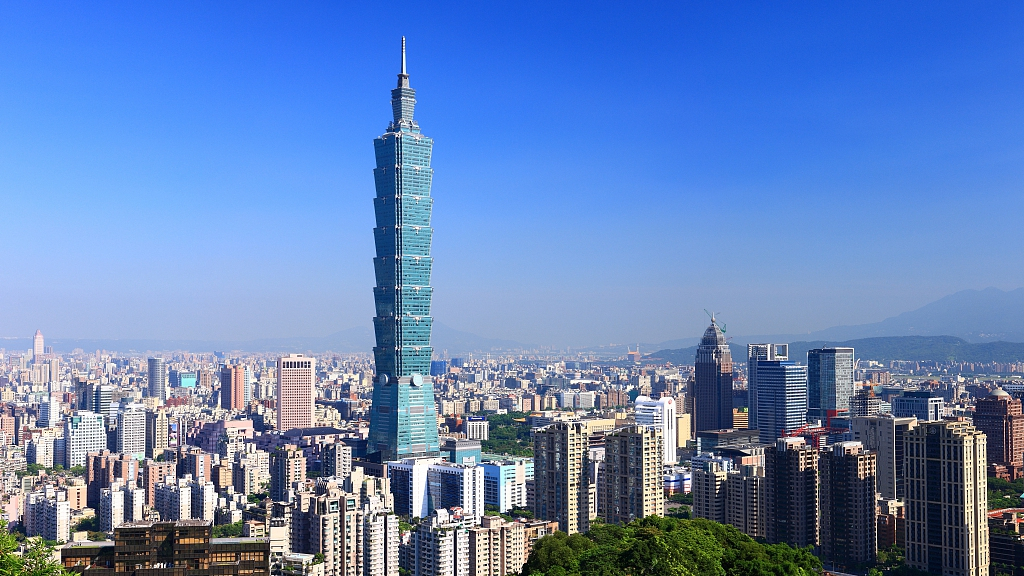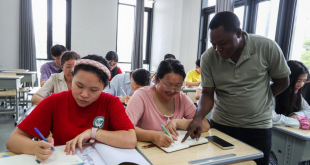Published: June 06,2024
By Mushahid Hussain Sayed

The Taipei 101 skyscraper commands the urban landscape in Taipei, Taiwan. [Photo/Xinhua]
The second serving of stale food is always unpalatable. Similarly, by trying to once again use the “Taiwan card” — a tried and tested but failed formula — the United States is serving a doubly stale dish that has no takers in the Global South.
Periodically, as part of its “check-China-rise strategy” and its zero-sum-game mindset, fuelled by the US’ military-industrial-complex, China hawks in Washington believe they have come up with new tactics in pursuit of their evil design.
In the past three decades since the Cold War was over, US politicians have openly said Americans and others may take extraordinary measures, including kindling separatism, to stop China’s rise.
No wonder even in today’s world, despite being a declining superpower, the US continues to fan the flames of “Taiwan independence”. The reason: the US’ mindset has not changed since the Cold War days.
Such a mindset, along with its irresponsible statements, is contrary to the pledges and commitments the US has made in the Three Joint Communiques. On Oct 25, 1971, the United Nations General Assembly unanimously passed Resolution 2758, which unequivocally states “the representatives of the Government of the People’s Republic of China are the only lawful representatives of China to the United Nations”.
Six months after the historic UN General Assembly resolution, in February 1972, to be precise, the US and China inked the Shanghai Communique which categorically states: “All Chinese, on either side of the Taiwan Strait, maintain there is but one China and that Taiwan is a part of China.”
Breaking solemn pledges and reneging on its international commitments are sadly a big part of the US’ track record, especially in foreign policy, be it the Paris Agreement, which former president Donald Trump withdrew from and incumbent President Joe Biden rejoined, or the Iran nuclear deal, signed by the Barack Obama administration but unfortunately abandoned by Trump.
Reinforcing this track record is the US’ obsession with “regime change”. Documented evidence shows that during the Cold War, the US tried 72 times to change regimes and governments, especially in countries in the Global South, using such agencies as the CIA.
Why is the US’ latest attempt to foment trouble in the Asia-Pacific region, by playing the “Taiwan card”, doomed to failure? First, as many media outlets and scholars said, the Western-supported post World War II global order is coming apart, due to the widening chasm between what is professed and what is practiced.
For instance, the US talks of “human rights” in China’s Xinjiang Uygur autonomous region but is silent on Israel relentlessly pounding the Gaza Strip, which is a grave crime against humanity. But how can the US protect human rights of the Palestinian people when it has been supplying weapons and military equipment, and providing monetary aid and diplomatic support to Israel?
Second, the world is witnessing two contrasting pursuits: while China is making efforts to help democratize international relations through connectivity and cooperation, as exemplified by the Belt and Road Initiative, which has seen $1 trillion being invested in projects in Asia, Africa, the Middle East and Europe over the past 10 years. In contrast, the US, since the Sept 11, 2001, terrorist attacks has been trying to militarize international relations, triggering confrontations and conflicts. Also, the US has squandered $6.5 trillion of US taxpayers’ money in the wars in Afghanistan, Iraq, Syria, Libya and Somalia.
Third, the Global South, including large parts of the Asia-Pacific, is in no mood to return to the Cold War days. That’s why there are no “buyers” for the US’ recipe of confrontation or a new Cold War, which is supplemented by hundreds of its overseas military bases worldwide and new security alliances and blocs such as AUKUS and QUAD.
The “Taiwan card” is already well past its expiry date and the sooner US policymakers realize this, the better, although for them, especially in this year of presidential election, politics always takes precedence over principles.
The author is the founding chairman of the Pakistan-China Institute, and chairman of the Senate DefenceCommittee, Pakistan.
China Daily.
 Africa -China Review Africa -China Cooperation and Transformation
Africa -China Review Africa -China Cooperation and Transformation
